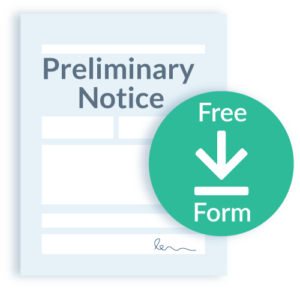Private projects
General contractors are not required to submit notice on private projects.
However, GCs are required to send a Notice of Intent to Lien at least 10 days before filing a lien.
“Levelset takes something that is pretty complex and makes it easy.”
General contractors are not required to submit notice on private projects.
However, GCs are required to send a Notice of Intent to Lien at least 10 days before filing a lien.
General contractors are not required to submit notice on public projects.
Since GCs will not make a claim against their own payment bond for non-payment, they do not have bond claim rights, and have no preliminary notice requirement.
Subcontractors and suppliers are not required to send a preliminary notice on private projects. However, they can send an optional Notice to Owner which requires them to withhold that amount from payments to the prime contractor.
However, claimants are required to send a Notice of Intent to Lien at least 10 days before filing a lien.
Subs and suppliers are not required to send a preliminary notice to preserve the right to make a claim against a payment bond on a public project.
A Colorado Notice to Owner isn’t required to secure mechanics lien rights. However, sending this notice has the effect of requiring the owner to withhold the amount claimed from the prime contractor. This notice is available for any potential lien claimant who did not contract directly with the property owner.
Note: the only actually required notice, for the purposes of Colorado mechanics’ liens, is the Notice of Intent to Lien.
If given, the Notice to Owner may be given to the owner at any time, either prior to performing work or after performing work and prior to sending Notice of Intent to Lien.
The Notice to Owner must be given to the property owner or reputed owner, or the superintendent of construction, agent, architect, to the financial institution or other person disbursing construction funds.
The following information is required to be included in a Colorado Notice to Owner:
• Claimant’s information
• Hiring party’s information
• A statement that the claimant has or will furnish labor and/or materials to the prime contractor or any person acting by authority of the owner
• Description of labor and/or materials provided
• Estimated or agreed value of labor and/or materials
→ Download a free Colorado Notice to Owner form here
Note: any defects in the notice will not invalidate the notice as long as it is “sufficient to inform the owner or reputed owner of the substantial matters provided in this section, or to put him upon inquiry as to such matters.”
A Notice to Owner may be given by personal delivery, by leaving the notice at the owner’s (or superintendent of construction’s, agent’s, architect’s, or financing institution’s) residence or place of business with some person in charge.
The Colorado Notice to Owner is considered served when actually received by the party being notified or when delivered to the requisite “person in charge.”
Notice to Owner is not required in Colorado, so there is no penalty to sending the notice late, if it is given at all. However, practically speaking, the earlier the better as this notice only applies to “undisbursed funds.”
No. Colorado does not require preliminary notice to preserve a claimant’s right to make a bond claim. However, any party may give a preliminary notice if so desired.
N/A
N/A
N/A
N/A
First, filing a lien under the circumstances you present is problematic. There are strict deadlines for noticing intent and recording your lien. Sounds to me like this is an afterthought and not within 4 months of your last date of work, but perhaps I'm wrong there. In any event, if you're seeking items from two years ago, I doubt that would go well for you under a mechanic's lien theory of recovery.
Second, it doesn't sound like there was much of an arrangement between you and the owner, this was something you were doing to improve the residence you were living in.
Third, if you're broke, what good is the mechanic's lien anyway? Even if it were valid, you'd still need to take action on it to pursue it. If they've just refi'd, I imagine the property is encumbered to a not-insignificant extent. The loan already closed, so presumably they aren't going to refi again or sell very soon. If you don't have the money to pursue a wrongful eviction, foreclosure likely isn't within your current financial ability to pursue. If you aren't going to foreclose, then you still have other claims and remedies, but I'd think you'd handle most of those claims and damages within a wrongful eviction case, should you ever have the means to pursue that case.
This is an example of the true mechanic's lien. It's governed by a different statute than the mechanic's lien on real estate. See C.R.S. 38-20-106. The lien is on the vehicle if the work is performed on the vehicle, and possession of the vehicle is key to the assertion of this type of lien.
Colorado does not require that a preliminary notice be provided prior to, or shortly after beginning to perform work or furnish materials on a project. However, Colorado does contemplate the sending of a best-practice preliminary notice that provides real effects on payment rights, and mandates that a notice of intent to lien be provided to the property owner in the event payment disputes escalate to the point that a lien is required.
In Colorado, any party other than the prime contractor is allowed to file a Notice to Owner. This notice, while not required, has powerful effects. Once the notice has been provided, “it is the duty of the [property owner] to withhold from such principal contractor . . . sufficient money due or that may become due to said principal contractor, or other persons, to satisfy such claim and any lien that may be filed therefor.” This means that if a sub-tier participant gives a preliminary notice prior to furnishing labor or materials to a Colorado project, the owner is obligated to withhold the amount referenced in the sub-tier participants notice to satisfy any claim that party may have for payment.
Additionally, any project participant may give a Disburser Notice pursuant to CO Rev Stat § 38-22-126 to, in effect, skip up the payment chain. If the disburser notice is provided appropriately, the disburser of funds is required to pay the claimant directly, or, if it doesn’t is directly liable for any damages suffered by the noticing party. For example, if a GC does not pay a subcontractor that has provided a proper notice to the disburser (generally the construction lender or owner), the disburser is required to pay the subcontractor directly from the construction loan or other funds, or will be directly liable if the sub remains unpaid.
Finally, in the event that a payment dispute exists to the extent that it appears a mechanics lien will need to be filed. Any such potential lien claimant is required to give the property owner, reputed owner, or owner’s agent, a Notice of Intent to Lien as well as a copy of the Statement of Lien that will be filed at least 10 full days prior to the filing of the mechanics lien itself.

The generic notice form can be used in Colorado, or any other state where notice is not required. It provides information about your company to the property owner, general contractor, and other parties in charge of payment on a construction project.

The next step is to fill out your form completely and accurately. GCs and owners often rely on this document to communicate with you, so mistakes on this form could cause payment delays.

Colorado doesn’t have any specific notice delivery requirements. You can deliver the notice however you see fit.
Select Preliminary Notice document.
Provide basic job information.
Levelset sends the document for you. Postage included!
Colorado’s mechanic’s lien statute can be found in Colorado Revised Statutes, §38-22-101 through §38-22-133. And, the rules and requirements specifically related to the Notice to Owner requirements can be found under §38-22-104(4)-(6). Updated as of 2020.
(4) Any of the persons mentioned in section 38-22-101, except a principal contractor, at any time may give to the owner, or reputed owner, or to the superintendent of construction, agent, architect, or to the financing institution or other person disbursing construction funds, a written notice that they have performed labor or furnished laborers or materials to or for a principal contractor, or any person acting by authority of the owner or reputed owner, or that they have agreed to and will do so, stating in general terms the kind of labor, laborers, or materials and the name of the person to or for whom the same was or is to be done, or performed, or both, and the estimated or agreed amount in value, as near as may be, of that already done or furnished, or both, and also of the whole agreed to be done or furnished, or both.
(5) Such notice may be given by delivering the same to the owner or reputed owner personally, or by leaving it at his residence or place of business with some person in charge; or by delivering it either to his superintendent of construction, agent, architect, or to the financing institution or other person disbursing construction funds, or by leaving it either at their residence or place of business with some person in charge. No such notice shall be invalid or insufficient by reason of any defect of form, provided it is sufficient to inform the owner or reputed owner of the substantial matters provided for in this section, or to put him upon inquiry as to such matters.
(6) Upon such notice being given, it is the duty of the person who contracted with the principal contractor to withhold from such principal contractor, or from any other person acting under such owner or reputed owner, and to whom, by said notice, the said labor, laborers, or materials, have been furnished or agreed to be furnished, sufficient money due or that may become due to said principal contractor, or other persons, to satisfy such claim and any lien that may be filed therefor for record under this article, including reasonable costs provided for in this article.